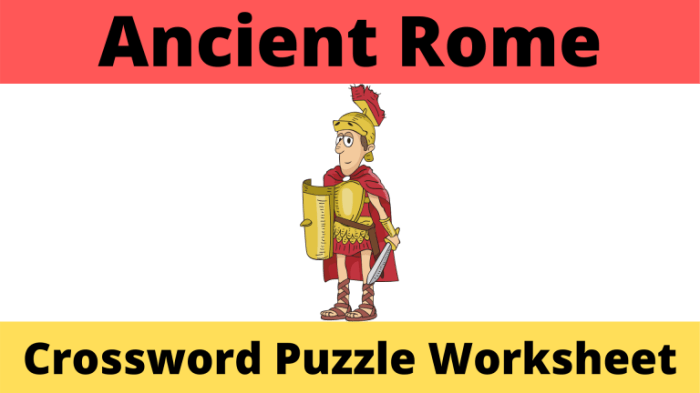Unveiling the ancient rome crossword answer key is an extraordinary journey through time, unlocking the enigmatic secrets of a civilization that shaped the course of Western history. Prepare to immerse yourself in a world of emperors, gladiators, and architectural marvels as we delve into the depths of ancient Rome.
Our exploration begins with a comprehensive overview of Roman history, tracing the empire’s rise and fall, unraveling the key events and influential figures that left an indelible mark on the ancient world.
Roman History
Ancient Rome played a pivotal role in shaping Western civilization, leaving an enduring legacy that continues to influence the modern world. The Roman Empire, founded in the 8th century BC, grew from a small city-state in central Italy to become one of the largest and most powerful empires in history, spanning vast territories across Europe, North Africa, and the Middle East.
Key Events and Figures
- Foundation of Rome (753 BC)
- Establishment of the Roman Republic (509 BC)
- Punic Wars (264-146 BC) against Carthage
- Rise of Julius Caesar and the establishment of the Roman Empire (1st century BC)
- Reign of Augustus Caesar (27 BC-14 AD), known as the Pax Romana
- Persecution of early Christians
- Fall of the Western Roman Empire (476 AD)
Roman Culture: Ancient Rome Crossword Answer Key
Daily Life, Ancient rome crossword answer key
Daily life in ancient Rome varied greatly depending on social status. The wealthy elite lived in luxurious villas with access to entertainment, baths, and feasts. The majority of Romans, however, lived in cramped apartments or tenements, often sharing facilities with neighbors.
The city was crowded and noisy, with a vibrant street life.
Religion
Religion played a central role in Roman society. The Romans believed in a pantheon of gods, including Jupiter, Juno, and Mars. Religious ceremonies and festivals were an important part of public life. The Romans also practiced divination, seeking guidance from the gods through the interpretation of omens and prophecies.
Arts, Architecture, and Literature
Ancient Rome produced a rich artistic and cultural legacy. Roman architecture is known for its grandeur and engineering prowess, with iconic structures such as the Colosseum and the Pantheon. Roman literature, influenced by Greek models, includes the works of Virgil, Ovid, and Cicero.
Roman art, including sculpture, painting, and mosaics, often depicted scenes from mythology and everyday life.
Roman Empire

Key Provinces and Territories
The Roman Empire encompassed vast territories, including:
- Italy
- Greece
- Spain
- Gaul (France)
- Britain
- North Africa
- Egypt
- Middle East
Roman Military
The Roman military was a key factor in the empire’s expansion and success. The legions, consisting of professional soldiers, were highly disciplined and effective. The Romans also developed advanced military technology, such as siege engines and naval vessels.
Political and Economic Structure
The Roman Empire was ruled by a complex political system that evolved over time. The emperor held supreme power, but was advised by a senate and a bureaucracy. The empire was divided into provinces, each governed by a governor. The Roman economy was based on agriculture, trade, and industry.
Roman Legacy
Impact on Western Culture
The legacy of ancient Rome is vast and enduring. Roman law, based on principles of justice and fairness, has influenced legal systems worldwide. The Latin language, spoken by the Romans, became the basis for many modern European languages. Roman architecture, art, and literature continue to inspire and influence modern culture.
Influence on Law, Language, and Architecture
Roman law, codified in the Corpus Juris Civilis, has had a profound impact on legal systems around the world. Latin, the language of the Romans, became the language of law, scholarship, and diplomacy in Europe for centuries. Roman architecture, with its emphasis on symmetry, proportion, and grandeur, has influenced building design from the Renaissance to the present day.
Roman Ideas and Practices in Modern World
Roman ideas and practices continue to shape the modern world. The concept of citizenship, the idea of a representative government, and the notion of a republic all have their roots in ancient Rome. Roman roads, aqueducts, and sanitation systems still form the infrastructure of many modern cities.
Query Resolution
What is the significance of ancient Rome in Western civilization?
Ancient Rome laid the foundation for many aspects of Western civilization, including law, government, language, and architecture.
Who were some of the key figures in Roman history?
Julius Caesar, Augustus, and Constantine the Great are among the most influential figures in Roman history.
What was daily life like for ancient Romans?
Ancient Romans lived in a highly stratified society, with wealthy citizens enjoying luxurious lifestyles while the majority of the population lived in poverty.